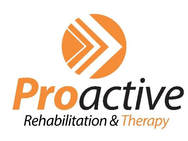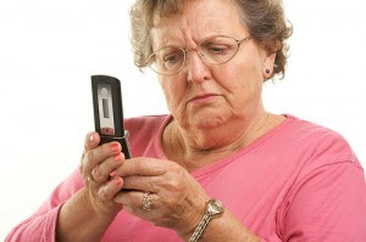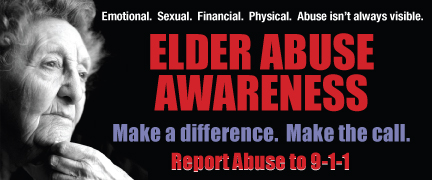Being a victim of abusive treatment can be frightening and overwhelming for anyone. For the elderly it is even more so due to vulnerability, isolation, frailty, and limited resources. A senior will often find him or herself at the mercy of the perpetrator of the abuse, who is frequently a caregiver or relative.
Fear can be a major factor that allows elder abuse to continue over time and not get reported. There may be a fear of not being believed, of not being taken seriously, of embarrassment/ stigma, of causing the abuser harm, and/or of a possible reprisal by the abusive person.
-Seniors may fear the possibility of causing harm to the abuser-
The first thing to do if you suspect that you or someone you know may be experiencing elder abuse is to recognize the signs.
Once you have recognized the abusive treatment for what it is you will be better equipped to proceed to the next step of supporting yourself or the elderly person.
A good place to start is to learn about available support services designed to advise or protect seniors facing abuse.
One support line available in Manitoba is the Age and Opportunity number at #204-956-6440. Age and Opportunity offers some over the phone counselling and other in person counselling services. I was informed that the service is a 24 hour phone service but that the Klinic crisis line is used after hours at #1-888-896-7183 or #204-786-8686.
Sometimes if there is a criminal act (an assault, battery, fraud or theft) it is appropriate to contact the police and make an official police report on the non-emergency line at #204-986-6222. The police also have a vulnerable person's unit that specializes in elder abuse concerns but it functions at an administrative level to assist officers better manage cases of abuse.
At an institution, in addition to considering making a police report, one should also determine whether the PPCO should be contacted for an investigation. The Protection for People in Care Office (PPCO) was established to look into complaints of abusive treatment occurring in institutions in order to educate staff and prevent future occurrences. The number listed to reach the PPCO is 204-788-6366 or Toll-free: 1-866-440-6366.
Following interventions to protect the elderly from abuse, it is advisable to provide treatment to prevent the long term and possibly devastating effects of traumatic stress. EMDR (Eye Movement Desensitization and Reprocessing) and other mind-body trauma talk therapies are particularly effective for resolving the heartbreaking effects that often linger following abuse.
Call David Chochinov at 204-299-7334 for assistance with elder abuse prevention strategies and traumatic stress therapy.
-Prevent the effects of traumatic stress with a mind-body talk therapy-
Fear can be a major factor that allows elder abuse to continue over time and not get reported. There may be a fear of not being believed, of not being taken seriously, of embarrassment/ stigma, of causing the abuser harm, and/or of a possible reprisal by the abusive person.
-Seniors may fear the possibility of causing harm to the abuser-
The first thing to do if you suspect that you or someone you know may be experiencing elder abuse is to recognize the signs.
- Emotional abuse often presents through the verbal treatment towards the elderly such as ridiculing, threatening, blaming, and/or yelling.
- Physical abuse includes causing injury and pain to the elderly. There may be bruises, fractures, cuts and scratches. Some other forms of physical abuse that occurs mostly in nursing homes or institutions includes inappropriate use of chemical restraints (medications used as sedatives), physical restraints (such as unnecessary wheelchair seat belts or fastened lapboards), and/or confinement.
- Sexual abuse involves any contact or sexual behaviour towards an elderly person without the elder’s consent.
- Neglect is the failure to meet the actual care needs of a senior by ignoring, even unintentionally, established care plans, routines, protocols or policies.
- Financial Abuse is any form of monetary exploitation such as fraud, a con, or theft.
Once you have recognized the abusive treatment for what it is you will be better equipped to proceed to the next step of supporting yourself or the elderly person.
A good place to start is to learn about available support services designed to advise or protect seniors facing abuse.
One support line available in Manitoba is the Age and Opportunity number at #204-956-6440. Age and Opportunity offers some over the phone counselling and other in person counselling services. I was informed that the service is a 24 hour phone service but that the Klinic crisis line is used after hours at #1-888-896-7183 or #204-786-8686.
Sometimes if there is a criminal act (an assault, battery, fraud or theft) it is appropriate to contact the police and make an official police report on the non-emergency line at #204-986-6222. The police also have a vulnerable person's unit that specializes in elder abuse concerns but it functions at an administrative level to assist officers better manage cases of abuse.
At an institution, in addition to considering making a police report, one should also determine whether the PPCO should be contacted for an investigation. The Protection for People in Care Office (PPCO) was established to look into complaints of abusive treatment occurring in institutions in order to educate staff and prevent future occurrences. The number listed to reach the PPCO is 204-788-6366 or Toll-free: 1-866-440-6366.
Following interventions to protect the elderly from abuse, it is advisable to provide treatment to prevent the long term and possibly devastating effects of traumatic stress. EMDR (Eye Movement Desensitization and Reprocessing) and other mind-body trauma talk therapies are particularly effective for resolving the heartbreaking effects that often linger following abuse.
Call David Chochinov at 204-299-7334 for assistance with elder abuse prevention strategies and traumatic stress therapy.
-Prevent the effects of traumatic stress with a mind-body talk therapy-




 RSS Feed
RSS Feed